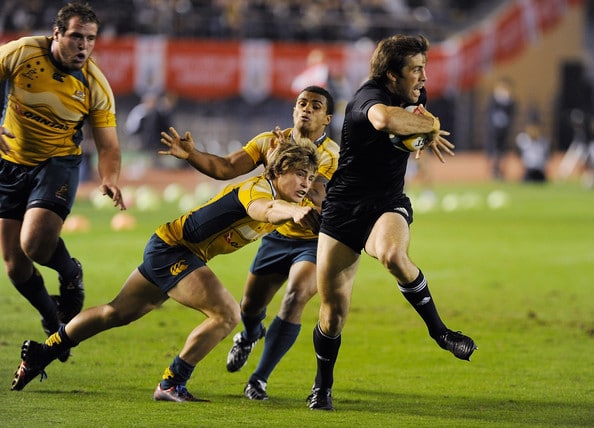The question to All Blacks centre Conrad Smith was a generous free-kick, with a Kiwi journalist asking him why New Zealanders should not be worried about Rugby World Cup 2011 following Saturday night’s loss to the Wallabies.
“Maybe they should be worried,” replied Smith, jolting his audience as he booted the free-kick directly into touch.
“I think they should realise it’s going to be a good contest, which isn’t a bad thing. There are quality sides out there and you have to be on your game at the start of every game to win those sorts of contests.
“I’m sure there will be a bit of panic. But if you’re a good team and your backs are against the wall, that should be when you play your best. If we’re any good, we’ll come out of this and it will be a lesson that has helped us.”
All Blacks coach Graham Henry took an upbeat view of his team’s 25-20 loss.
“Hopefully, if there was any complacency in this group, it’s gone now,” he said.
Henry also pointed out that there was no historical correlation between winning the Tri Nations and the Rugby World Cup in the same year. He was, of course, correct, given that the southern hemisphere titles in 1999, 2003 and 2007 all were won by sides that then failed to live up to expectations at the Rugby World Cup.
“There is no blueprint that winning a Tri Nations is the recipe for winning a World Cup,” Henry said.
What he neglected to mention, however, was that in all three years, it was the All Blacks who failed to carry their triumphant Tri Nations form into the Rugby World Cup.
Worryingly for New Zealand, there were echoes on Saturday night of the 2007 debacle in which the All Blacks were eliminated in the Rugby World Cup quarter-finals by France.
On that night in Cardiff, the All Blacks showed an alarming lack of tactical nous in persisting with a one-dimensional pick-and-go attack that clearly wasn’t working, with no on-field leader, not even Richie McCaw, able to devise a new approach on the run.
Against the Wallabies at Suncorp Stadium, the All Blacks persisted throughout the first half in attempting to move the ball out wide, even though playmaker Dan Carter noted the Australians were defending “slightly differently”.
Indeed they were, using an up-and-in pattern where the wingers came up quickly and herded the attack into the midfield where Pat McCabe and Anthony Faingaa, aided by backrowers Radike Samo, Rocky Elsom and David Pocock, mowed them down.
“I felt, especially in the first half, we weren’t able to strike wide all that well, hence going to much more direct plays in the second half, which served us well,” Henry said.
Yet it wasn’t until the All Blacks went into the sheds at half-time and were able to receive advice from the coaching staff to abandon the wide attack and instead go narrow that New Zealand were able to get back into the game.
Buford Balony says: The hands are around the throat already.


